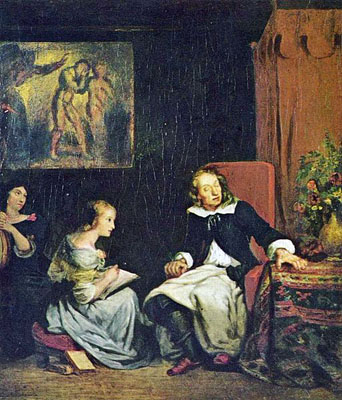When I consider how my light is spent
Ere half my days in this dark world and wide,
And that one talent which is death to hide
Lodg'd with me useless, though my soul more bent
To serve therewith my Maker, and present
My true account, lest he returning chide,
"Doth God exact day-labour, light denied?"
I fondly ask. But Patience, to prevent
That murmur, soon replies: "God doth not need
Either man's work or his own gifts: who best
Bear his mild yoke, they serve him best. His state
Is kingly; thousands at his bidding speed
And post o'er land and ocean without rest:
They also serve who only stand and wait."
- John Milton, “On His Blindness”

If you’ve taken a high school or college British literature class, you’ve probably heard of John Milton. This seventeenth-century poet composed two of the most famous epic poems in the English language: Paradise Lost and Paradise Regained, which relate Adam and Eve’s introduction of sin into the human story, followed by Christ’s redemptive victory over that sin.
Milton’s achievements are all the more impressive when one takes into account that by the time he crafted these works, he was blind. His blindness was so advanced that he would compose his poetry but then had to rely on others to write down the words he dictated.
The sonnet “On His Blindness” reveals some of Milton’s struggle to come to terms with the loss of his vision. Milton begins with a difficult question, one that the biblical Job would have understood well: Why would God give such wonderful talents with which to serve him, only to take them away? Clearly, Milton was deeply gifted. More importantly, he was passionate about using his gifts to bring glory to God. So how could God expect service if Milton could no longer see—physically, but also metaphorically—how to use those gifts?
The second half of the sonnet offers a profound answer: Milton’s service was not the point. Milton’s poetic talent, and his use of that talent, were not the point. “God doth not need / Either man’s work or his own gifts”—rather, God looks for hearts that are willing to serve him whether or not things make sense. The King of Kings has vast resources at his disposal to accomplish whatever he wants. Action is not what he most desires from us. He wants our hearts, our love and trust, and our full abandonment to his will—even when that will looks counterproductive to our finite eyes. Whether we go on to write one of the greatest poems of all time, or our service remains hidden until Christ’s return, we, too, can serve if we also take the time to “stand and wait” for whatever and wherever he leads.












